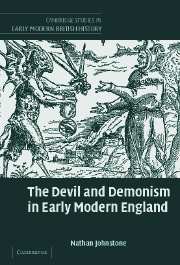Book contents
- Frontmatter
- Contents
- Acknowledgements
- 1 Introduction
- 2 The synagogue of Satan: anti-Catholicism, false doctrine and the construction of contrariety
- 3 Temptation: the Protestant dynamic of diabolic agency and the resurgence of clerical mediation
- 4 Satan and the godly in early modern England
- 5 Incarnate devils: crime narratives, demonisation and audience empathy
- 6 ‘What concord hath Christ with Belial?’: de facto satanism and the temptation of the body politic, 1570–1640
- 7 ‘Grand Pluto's Progress through Great Britaine’: the Civil War and the zenith of satanic politics
- 8 ‘The Devil's Alpha and Omega’: temptation at the cutting edge of faith in the Civil War and the Interregnum
- Conclusion
- Bibliography
- Index
- Cambridge Studies in Early Modern British History
5 - Incarnate devils: crime narratives, demonisation and audience empathy
Published online by Cambridge University Press: 23 June 2009
- Frontmatter
- Contents
- Acknowledgements
- 1 Introduction
- 2 The synagogue of Satan: anti-Catholicism, false doctrine and the construction of contrariety
- 3 Temptation: the Protestant dynamic of diabolic agency and the resurgence of clerical mediation
- 4 Satan and the godly in early modern England
- 5 Incarnate devils: crime narratives, demonisation and audience empathy
- 6 ‘What concord hath Christ with Belial?’: de facto satanism and the temptation of the body politic, 1570–1640
- 7 ‘Grand Pluto's Progress through Great Britaine’: the Civil War and the zenith of satanic politics
- 8 ‘The Devil's Alpha and Omega’: temptation at the cutting edge of faith in the Civil War and the Interregnum
- Conclusion
- Bibliography
- Index
- Cambridge Studies in Early Modern British History
Summary
Temptation provided the godly with intense personal experiences of Satan's agency, but what of those, probably the majority, whose religious and moral observance was too unreflective to incorporate the rigorous introspective scheme, which for the godly identified temptation and encouraged an engagement with the experience? Were complex experiences of temptation largely confined to zealous Protestants with the inclination to indulge in in-depth self-examination and, consequently, was the influence of the Protestant emphasis on the Devil's internal agency limited? Whilst the majority of the population of sixteenth- and seventeenth-century England have left no record of their demonological beliefs, those areas of culture which sought to appeal to a sense of the demonic provide insight into the potential for a far wider influence of the concept of internal temptation. Any study of demonism must take account of demonisation, identified by historians as prevalent from the medieval period to the present. The practice of stigmatisation by associating subjects with the Devil has been interpreted as a simplistic form of projection, in which groups and individuals were marginalised in a functionalist one-way exchange of meaning. Jews, heretics, criminals, witches and subversives might be made to appear alien and ‘anti-human’ by association with Satan, justifying their persecution. Yet a very different picture is revealed by an examination of demonisation in early modern England – particularly the ‘populist’ demonisation of criminals which became a prevalent part of the developing pulp press.
- Type
- Chapter
- Information
- The Devil and Demonism in Early Modern England , pp. 142 - 174Publisher: Cambridge University PressPrint publication year: 2006

